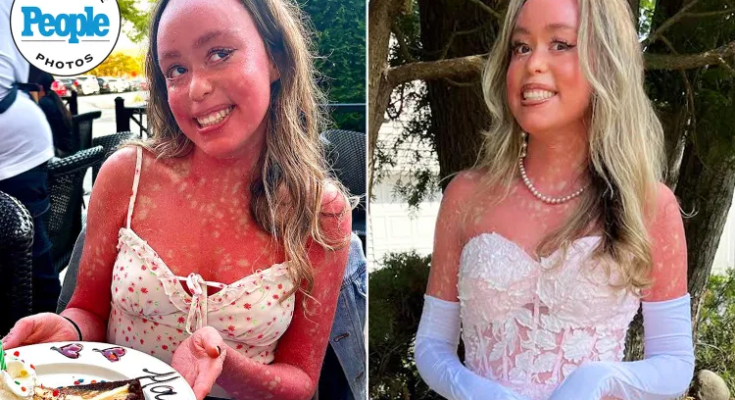NEED TO KNOW
- Portia Cina was born with ichthyosis confetti, an extremely rare genetic skin condition that leaves bright red patches scattered across her body
- The condition causes her skin to grow and shed up to 14 times faster than average, leaving her without a full protective top layer
- According to the Foundation for Ichthyosis and Related Skin Types (FIRST), there is no cure for ichthyosis
When strangers see Portia Cina, they often pause before asking the same question:

Are you sunburnt?”
The 18‑year‑old just smiles and shakes her head.
Portia was born with ichthyosis confetti, an extremely rare genetic skin condition that leaves bright red patches scattered across her body, along with tiny white “confetti‑like” spots where her skin slowly heals itself. According to the Foundation for Ichthyosis and Related Skin Types (FIRST) there is no cure for ichthyosis.
The condition causes her skin to grow and shed up to 14 times faster than average, leaving her without a full protective top layer.
“My skin’s essentially a different protein,” the New Jersey native tells PEOPLE exclusively. “The white spots are my regular skin growing back, and over time, they get bigger and bigger.”
Her mom, Jolie, 50, vividly remembers the day Portia was born.
“When she arrived, she presented a little differently,” Jolie recalls. “But we were lucky. Living in the tri‑state area gave us access to some of the top dermatologists in the country.”
Within days, the family connected with specialists at NYU, the Children’s Hospital of Philadelphia, and even a department at Yale dedicated to rare forms of ichthyosis. Through FIRST, they found not just medical guidance but a supportive community.
By 11 months old, Portia was attending her first FIRST family conference in Chicago, surrounded by children and families who looked like her.
“That was really when we first met other families like ours,” Jolie says. “The foundation has been incredible, with conferences, regional meetings, and constant support. It gave us so much knowledge and reassurance.”
For Portia, there was never a single moment of “realizing” she was different — it was simply part of her life.
“I’ve kind of always known,” she says. “There wasn’t an ‘aha’ moment. My daily routines, all the skincare I do, were always a reminder that my skin isn’t like everyone else’s.”
At home, growing up alongside her brother — who also has the condition — gave Portia a sense of normalcy.
“We’re in the state of New Jersey, so they say there’s about three kids born with it every year,” Jolie says. “She’s literally one in a million, as is her brother.”
But school was different. Elementary school brought stares and whispers. By sixth grade, when all four local elementary schools merged into one middle school, the feeling of isolation deepened.
“My parents had sent a letter to the school explaining my condition,” she says. “It created two reactions: some kids felt bad for me and treated me like I was fragile, and others whispered or stared because, to them, I just looked sunburnt.”
Seventh grade was a turning point, when she found a tight‑knit group of friends who treated her like everyone else.
“We never talk about my skin,” she says. “I love them so much, and I’ve worked really hard to have the relationships I have now. Even though I knew I was different, I’ve never felt alone.”
Outside of school, Portia threw herself into creative pursuits: drawing, painting with watercolor and playing piano. She even joined a local band that performed around town.
Eventually, she joined TikTok to share her passions. At first, she posted music and typical teen content. But curiosity about her skin followed her online, just as it had in real life. So one day, she decided to make a single video explaining her condition, just to “get it out of the way.”
“I wanted people to know my story, and then I could keep posting without having to repeat myself,” the recent high school graduate says.
She filmed the 10‑minute clip quickly, right before heading out to see How to Train Your Dragon with her brother. She never imagined it would go viral, but the video exploded, reaching more than 13 million people.
The response was overwhelming and unexpectedly moving.
“I was getting comments from doctors and med students saying they had never seen this before and thanking me for educating them,” Portia says. “Paramedics, too. It felt really good to know I was helping people learn about my condition.”
“One person said, ‘I have ichthyosis vulgaris,’ ” she adds. “It created this chain of connection. It’s cool to be that person showing that people who look different are just like anyone else. I’m literally just an 18‑year‑old girl living her life.”
For her mom, Jolie, watching the reaction online has been emotional.
“I’m so proud of her,” Jolie says. “Seeing people comment on her videos, telling her how beautiful she is or how great her makeup looks — it’s just amazing. Social media isn’t always kind, especially to someone with a visible difference, but the kindness we’ve seen has been incredible.”
“If even one little girl sees Portia online and feels less alone — or if someone spots her in the grocery store and already knows her story, instead of asking if she’s sunburnt — that makes a difference,” she adds. “The fact that dermatologists and doctors have also learned from her videos means she’s making an impact in ways we never imagined. It’s incredible.”
Looking toward the future, Portia is excited to begin her next chapter at the Savannah College of Art and Design this fall, where she’ll study animation and combine her love of drawing, painting and storytelling.
While she’s proud to raise awareness about ichthyosis, Portia hopes her life — and her content — won’t be defined solely by her condition.
“I believe in advocacy, and I’m glad I can educate people,” she says. “But I also want to create like any other person my age. I’ve worked hard to make my life feel just like anyone else’s. I want to share my passions and show that I’m more than my skin — not everything I do has to come back to that.”
She laughs softly. “Honestly, I just want to live a normal life. People sometimes expect you to have this big purpose if you look different, but I just want what everyone else wants — to make good friends, have a great college experience, and do all the regular things any other 18‑year‑old would do.”
Her mom, Jolie, beams with pride. “Portia has grown into such an amazing person,” she says. “People with visible differences can sometimes become introverted if they feel uncomfortable, but Portia is the opposite. Whether it’s through her music or her piano performances, she’s always been willing to put herself out there.


